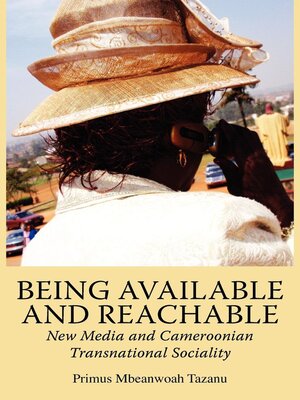Being Available and Reachable
ebook ∣ New Media and Cameroonian Transnational Sociality
By Mbeanwoah Tazanu

Sign up to save your library
With an OverDrive account, you can save your favorite libraries for at-a-glance information about availability. Find out more about OverDrive accounts.
Find this title in Libby, the library reading app by OverDrive.



Search for a digital library with this title
Title found at these libraries:
| Library Name | Distance |
|---|---|
| Loading... |
The book investigates what have become of Cameroonian transnational family and friendship ties in the age of the mobile phone and the internet that make people readily available and reachable. Most theoretical literature states that these tools of sociality cement transnational social relationships through instantaneous interaction. To capture the different experiences and impressions on the significance of these media in easing communication for migrants and non-migrants, Tazanu draws on ethnographic accounts based on his fieldwork in Freiburg (Germany) and Buea (Cameroon). He argues that it is mainly the migrants who maintain or are expected to maintain ties with non-migrants back in Cameroon through calls and material support. The main finding of the study is that cell phones and the internet have facilitated discontents, grudges, insults, fights, avoidance, arguments and estrangement of relationships much more than they have contributed to binding friends or families through direct mediation. Underlying these aspects of distanciation are the high expectations and sometimes contradictory motives for instant virtual interaction. Non-migrants� accounts suggest that direct availability and reachability should lead to uninterrupted transnational interaction and also that the cultural practices of remittances from migrants are easily requested and coordinated. Such motives are generally contrary to migrants� wishes, willingness or ability to support friends and families in Cameroon. These unexpected outcomes arising from rapid speed of interaction questions the advantages that are often associated with instant sociality across space and time. The finding is a call for the cultural background and life-world experiences of media users to be taken into consideration when theorising the significance of information technology in the debate on media globalisation.







